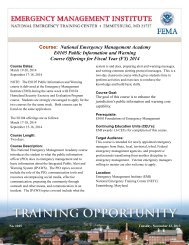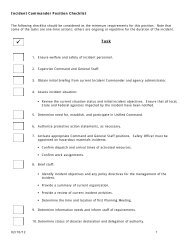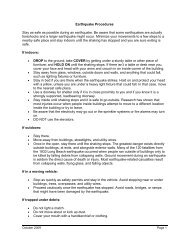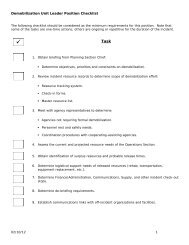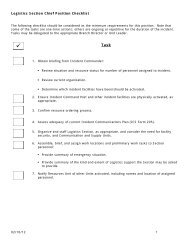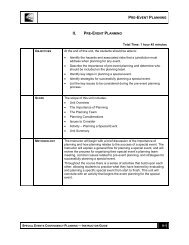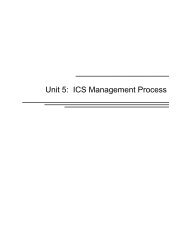Effective Communication - Emergency Management Institute ...
Effective Communication - Emergency Management Institute ...
Effective Communication - Emergency Management Institute ...
Create successful ePaper yourself
Turn your PDF publications into a flip-book with our unique Google optimized e-Paper software.
UNIT 2: BASIC COMMUNICATION SKILLS<br />
Tips<br />
Hearing vs. Listening<br />
Hearing is the special sense by which noises and tones are received as stimuli.<br />
Hearing is a sensory experience that gathers sound waves indiscriminately. We<br />
can hear something without choosing to listen.<br />
Listening is a voluntary activity. Listening includes more than just sound being<br />
received by the ear and transmitted to the brain. Listening includes interpreting<br />
or processing that sound. Active listening involves listening with empathy.<br />
Active Listening<br />
When you listen empathically, you don’t just hear words. You hear thoughts,<br />
beliefs and feelings. Empathic listening is highly active and requires hard work.<br />
Following the steps below will help you to improve your listening skills.<br />
1. The first step is to decide to listen and concentrate on the speaker.<br />
2. Then, use your imagination and enter the speaker’s situation. Concentrate<br />
and try to imagine his or her frame of reference and point of view.<br />
3. Observe the speaker’s vocal inflection, enthusiasm or lack of it, and style of<br />
delivery. These are essential components of the message. If you are<br />
speaking face-to-face, pay attention to the speaker’s facial expressions and<br />
other nonverbal cues for more insight into the message.<br />
4. Listen without interruption. Note key phrases or use word associations to<br />
remember the speaker’s content.<br />
5. Use paraphrasing or clarifying questions to confirm that you received the<br />
intended message. Check your perceptions of how the speaker is feeling to<br />
put the text of the message in emotional context.<br />
6. Finally, provide feedback to the speaker.<br />
Practice Active Listening<br />
Like other skills, listening skills improve with practice. Ask a trusted friend to<br />
rate you honestly on the listening self-assessment that you conducted earlier in<br />
this unit. Then, the next time someone comes to you with a problem, work on<br />
the listening skills that need improvement. Practice empathic listening by<br />
attending, paraphrasing, and asking questions.<br />
<strong>Effective</strong> <strong>Communication</strong> Page 2.5



